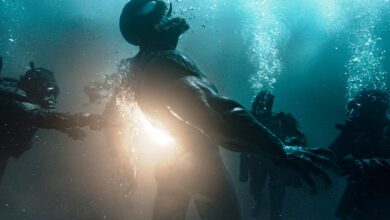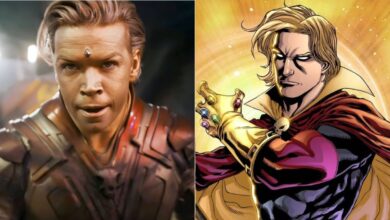Munich The Edge of War: Did Legat and Von Hartmann Really Exist? The True Story Of The Protagonists
Christian Schwochow's historical drama based on the novel by Robert Harris is on Netflix, in which George MacKay and Jannis Niewöhner play the two young diplomats: fictional characters, but inspired by real people.
From January 21, the historical drama Munich The Edge of War is available on Netflix, the adaptation of the novel written in 2017 by Robert Harris, the author of bestsellers such as Fatherland, Enigma, The ghostwriter and The officer and the spy. Directed by the German Christian Schwochow, the film reconstructs the fateful moment that in September 1938 defined the future of Europe: the Munich Conference, the meeting between Germany, Great Britain, Italy and France that gave the green light to Hitler for the annexation of Czechoslovakia and did not serve to avoid war, but only to postpone it for a year.
Munich The Edge of War: Did Legat and Von Hartmann Really Exist? The True Story Of The Protagonists

Scripted by Ben Power, Munich The Edge of War is a spy thriller that cleverly blends history and fiction, recounting in particular the days leading up to the ill-fated agreement between the four heads of state. As in most of his novels and this adaptation, Harris relegates the main figures to the background, focusing on two fringe characters with an intimate yet powerful vision of the event. How much truth and how much fictional is there in the protagonists played by George MacKay and Jannis Niewöhner? Let’s find out together.
Munich The Edge of War: The Plot Of The Movie
Hugh Legat is a young British diplomat who works at 10 Downing Street as secretary to the prime minister, conservative Neville Chamberlain (Jeremy Irons). His marriage to Pamela (Jessica Brown Findlay) is in crisis because he dedicates too much time to work and little to family. Paul von Hartmann is part of the staff of the German Foreign Ministry, but in reality, disappointed by the Third Reich of which he was a proud supporter, he joined the anti-Hitler resistance with some Wehrmacht generals.
The two are old friends: they studied together in Oxford with Lenya (Liv Lisa Fries), Paul’s girlfriend at the time. Then something broke. In September 1938, they have not seen or heard from each other for six years. The period is dramatic: Adolf Hitler (Ulrich Matthes) is preparing to invade Czechoslovakia to reclaim the Sudetenland and the Chamberlain government tries to resort to diplomacy to avert the outbreak of a conflict that no one, apparently, wants.
The paths of Legat and Von Hartmann cross again in Munich, where the two are engaged, with their respective delegations, in the Conference that brings together Hitler, Chamberlain, Benito Mussolini (Domenico Fortunato) and Édouard Daladier (Stéphane Boucher).
Paul’s risky mission, watched over by the menacing high-ranking SS Sauer (August Diehl), is to pass that memorandum to Hugh so that Hugh, already alerted by MI6, delivers it to Chamberlain and the prime minister does not sign it agreement. Only by knowing Hitler’s real expansionist aims will the British government and the whole world know what the dictator’s intentions are.
Who Are Legat And Von Hartmann Inspired By
Robert Harris had already confronted Nazi Germany and the aftermath of World War II, first with the investigation Hitler’s Diaries (on the Führer’s false diaries) and then with Fatherland and Enigma.
Hugh Legat and Paul von Hartmann are characters born of his imagination. The English writer, however, explained in an interview with PBS that he was inspired by a prominent personality who really existed.
Von Hartmann closely follows the diplomat Adam von Trott zu Solz , the cosmopolitan lawyer from Potsdam who considered Nazism and patriotism incompatible from the beginning. During his numerous travels and assignments abroad, he became painfully aware of the aggressive National Socialist foreign policy (although, as a good nationalist, he thought that Czechoslovakia had no right to exist) and the growing persecution of Jews and other minorities.
Von Trott had attended Mansfield College in Oxford and in 1934 joined the Kreisau anti-Nazi resistance led by Helmuth Graf von Moltke. In 1939 he was hired by the Foreign Office to seek allies in Great Britain and the United States in the fight against the regime: he was one of the few German diplomats of his generation to oppose the Third Reich. Following the failed assassination attempt on Hitler, Von Trott was arrested on 25 July 1944, tortured and finally executed in Berlin’s Plötzensee prison on 26 August.
During his time in Oxford, Adam von Trott zu Solz met and became friends with Alfred Leslie Rowse : although Harris made it clear that Hugh Legat’s character is “a completely fictional figure”, there is a curious connection with the historian and British poet.

A scholar of Elizabethan England, during the 1930s Rowse was a young Marxist socialist (he ran unsuccessfully for the Penryn and Falmouth seat with Labor), a defender of British imperialism, a fervent anti-German but a staunch advocate of Chamberlain’s appeasement. The contrast with Von Trott, in reality, did not arise for political but philosophical reasons: according to the chronicles of the time, their friendship did not survive the bitter differences on Hegel’s thought. A lover of cats and his homeland of Cornwall, Rowse died on October 3, 1997 at the ripe old age of 93.
The Plot Against Hitler in 1938?
It has now gone down in history and entered the popular imagination thanks to Bryan Singer’s film Operation Valkyrie, the attack organized by the aristocratic class and by members of the army which in the late morning of 20 July 1944 was to kill the Führer. In the case of Munich: on the verge of war, reference is made to a conspiracy of anti-Nazi officers and officials as early as 1938 to oust Hitler in a putsch, if the allies had stood up to him at the Munich Conference.
Indeed, there was indeed a secret protocol in which Hitler expounded his war plans: it is known as the Hossbach memorandum. The protocol dates back to November 5, 1937, when the Führer gathered some senior officers for a conference at the Reich Chancellery in Berlin. Hossbach was the name of Hitler’s military assistant colonel who wrote the unauthorized report of that summit.
Adam Von Trott participated in Operation Valkyrie and actually met Chamberlain, although not in Munich but at Checkers, the prime minister’s country home in Buckinghamshire. However, that meeting took place only in June 1939 when it was too late: Hitler had torn the Munich agreement, occupied Bohemia and Moravia and put the world on the road to war. In real history, moreover, Czechoslovakia ambassadors sent to Munich were banned from the conference that was deciding their future and dividing their country.
Was Neville Chamberlain Really a Hero?
Schwochow’s film focuses on the figure of Chamberlain, who has become the symbol of renunciation policy and concessions to Axis dictators in the illusion of avoiding war. Monaco’s description of the British premier is conflicting.
Historian Nigel Jones writes in BBC’s History Extra that the “thoughtful and sensitive” portrayal of the “man with an umbrella” (as the prime minister was called in his homeland for his bourgeois and formal look) as an elderly and compassionate who sacrifices his credibility in an attempt to save millions of people from the horrors of war, is “grossly misleading”.
Not even what the film reports on the credits – Chamberlain resigned as prime minister because he was overwhelmed by criticism and died in 1940, but at least the time gained with the Munich agreement allowed the Allies to prepare for war – convinces Jones. The historian argues that the RAF combat air defense organization set up in that poor year was part of the rearmament program that Chamberlain himself had approved when he was Chancellor.
Chamberlain returned to London greeted at the airport by a cheering crowd and with an agreement hailed as a great success. The prime minister waved the infamous “piece of paper” convinced that he had won a diplomatic victory and assured that there would never be a need for a war. The illusion of being able to trust “Herr Hitler” would be shattered just six months later. The dream of “peace for our time” would soon turn into a nightmare.
Faced with the facts, Munich The Edge of War fails to do with Chamberlain what Darkest Hour did for Winston Churchill. He remains a Jeremy Irons in great shape : the actor is the perfect double of the old Neville and seems born to play this role.





